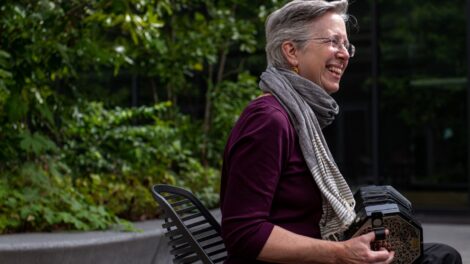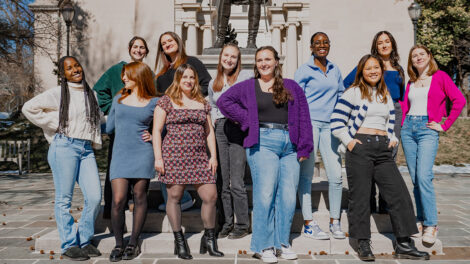A celebration of sound exploration
By Bryan Hay
As Prof. Holly Roadfeldt began thinking last summer about thematic concepts for this year’s World Piano Day, she tapped into Lafayette’s collaborative, interdisciplinary culture and a book that reveals the instrument’s range of emotional expression. She found perfect chemistry.
After reading A Natural History of the Piano, Roadfeldt sent an email to Heidi Hendrickson, assistant professor of chemistry. The two had already been acquainted from when Hendrickson attended an honors piano recital by one of her students, Phuong Nam Vu ’25, who studies with Roadfeldt, Lafayette’s piano instructor.
“One of the categories in the book is ‘The Alchemists,’ with Part I titled ‘Chemistry,’” Roadfeldt recalls sharing in her email. “It is a stretch. But I kept thinking that there is a collaboration in there.
“The composers are Debussy, Bill Evans, Duke Ellington, Alexander Scriabin, Olivier Messiaen, and Arnold Schoenberg,” she continues in her message. “The art of perfumery, as practiced by scientists like biophysicist Luca Turin, is actually a perfect metaphor for Debussy’s harmonic world. In a letter to his publisher, Debussy referred to his piece ’Reflets dans l’eau’ as representing his most recent discoveries in harmonic chemistry.
“What do you think? A possibility of an evening recital with Debussy and chemistry? I think this could be incredible.”
And so, a collaborative plan began to bubble and churn like a chemical reaction in a lab.
Throughout the day on March 28, the music and chemistry departments will join together in celebration of the second World Piano Day. The day is celebrated on the 88th day of the year, in symmetry with the number of keys on the piano.
The program will offer a student panel 12:15-1:05 p.m. in the Gendebien Room at Skillman Library; a guest lecture by pianist Victor Batista, John Gamble Kirkwood Professor of Chemistry at Yale University, on quantum information science and how quantum technology can be interpreted through music and vice versa, 4:10-5 p.m. in 103 Hugel Science Center; and an 8 p.m. concert in the main Williams Center theater featuring performances by Vu, Katie Liu ’25, Daniel Ruggiero ’25, Owen York ’26, Roadfeldt, and Lewis Baratz, director of Lafayette’s chamber orchestra and harpsichord and recorder teacher.
“Heidi and I planned a World Piano Day celebration that brings together music and science, with an emphasis on how we can use music as a way to understand and interpret our world,” Roadfeldt says.
“Among other things, we’ll be talking about the chemistry of sound and how a pianist changes techniques to make the sound work and understand the instrument differently,” says Roadfeldt, who will perform Anthony J. Lanman’s “Hommage à Eddie Van Halen” and give the world premieres of “moulin à vent vagues” by York and “Reue” by Conrad Tilroe Jr. ’25.
“We have to be engineers of sound, even chemists and alchemists at times. These are always key considerations,” she explains. “Because of all of these academic layers, this program gives an opportunity to collaborate with students as well as tie them into relevant STEM connections.”
Hendrickson, who will have an opportunity to reunite with Batista, her postdoc adviser at Yale, hopes Lafayette’s World Piano Day event will offer students time to discover for themselves the connection between music and science, particularly Roadfeldt’s students, many of whom study piano as well as science and engineering.
“The interconnection of disciplines here at Lafayette is really exciting for me,” she says. “I just love all of the interest and support on campus for these kinds of events and when students explore how sciences and the humanities interconnect. These boundaries are very arbitrary.”
At larger institutions, it’s more challenging to create these opportunities because of the larger walls that separate people in different disciplines, Hendrickson adds.
“It’s really sad when you can’t form those interdisciplinary connections,” she says. “But we’re fortunate at Lafayette, which is small enough for us to really engage with one another and make interconnections explicit for students.”
During a recent studio lesson with Roadfeldt at Williams Center, Vu rested his hands for a moment during a work by Debussy and thought about how music helps him navigate college life. Majoring in mathematics and computer engineering, he has been playing the piano since elementary school.
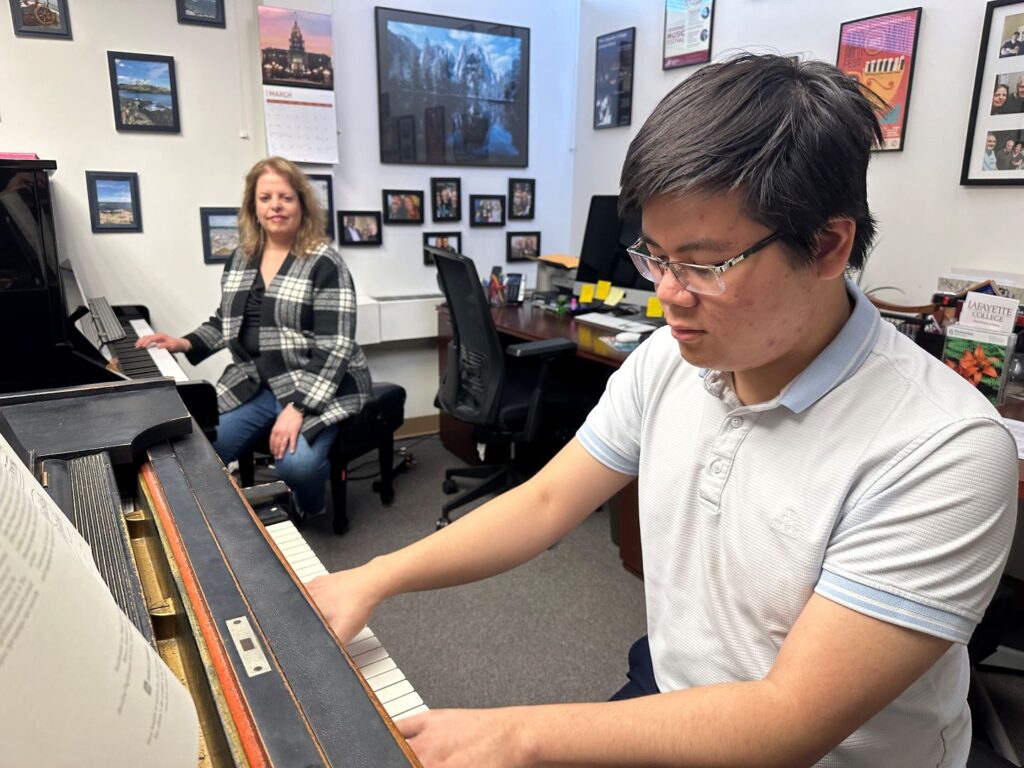
Prof. Holly Roadfeldt and Phuong Nam Vu ’25.
“Music helps me balance my workload. When I practice the piano, I have to be fully immersed in that to understand the piece I’m working on,” he says. “Music gives me a quiet and safe space to provide calm in my coursework and social life. Lafayette is where I can find the opportunities to pursue music and my other areas of interest.”
Liu, a chemistry major with a minor in music, who will perform “Fours” by Michelle McQuade Dewhirst during the evening concert, started piano when she was 5 years old.
“Music gives me confidence in other aspects of my life,” she says. “It helps to harness that in my academic pursuits, such as securing a research position or even attending office hours. Music also brings introspectiveness to my lab work, because practice methods can be related to reasoning in lab techniques.”
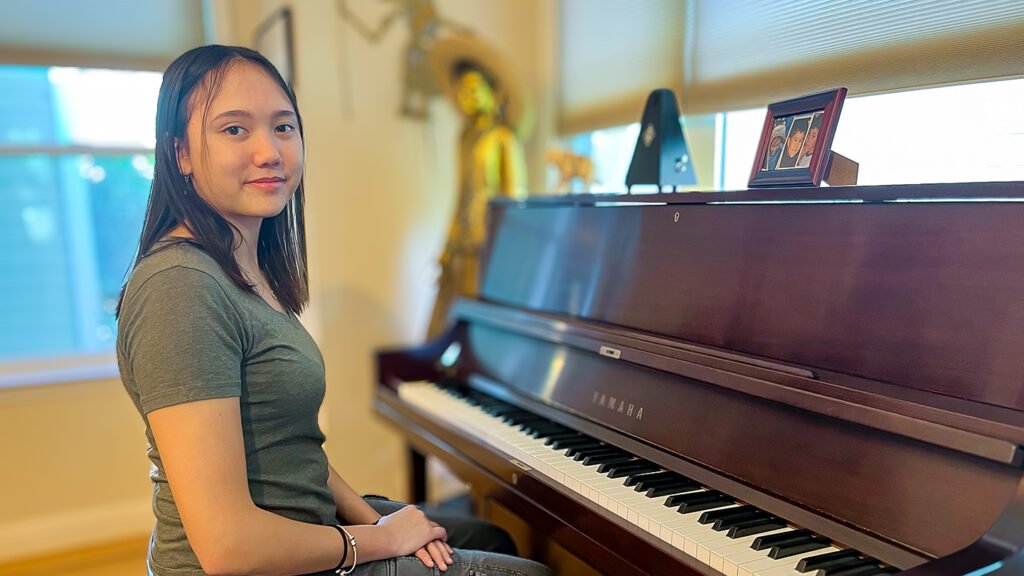
Katie Liu ’25
Inspired by Hendrickson’s Physical Chemistry II course and her piano lessons with Roadfeldt, Liu is thrilled that the two joined to put together the World Piano Day event, with each bringing their unique perspectives to show how science and music thrive together.
“Both of these women are inspiring. Prof. Hendrickson is pioneering a new way of creative teaching using a software system called Mathematica, and she always greets every class with a cheery attitude. The concepts of the course, being mostly quantum mechanics-related, are incredibly hard to teach, but I feel more confident with her guidance,” she says. “Prof. Roadfeldt is one of the strongest women I have met, and her mentorships with her students are truly valuable. I have developed a new perspective on piano, music, and feminism with her teaching, and that is impressive as I have been a music student for so many years before.”
The March 28 program is important to Lafayette to show the seriousness of the academic pursuit of music, she adds.
“A large percentage of students who I know in the music department are majoring in a STEM field. A lot of students like to say that they pursue music at Lafayette because it is a passion, an avenue for personal discoveries or curiosities, and sometimes a way to balance their lives,” Liu says. “I think that begs the question of how other academic departments can empower these feelings and pursuits.”
During a quiet night in a nearly empty Williams Center, three other Roadfeldt piano students gathered to talk about the World Piano Program, what it means for Lafayette, and how music and the sciences are intertwined.
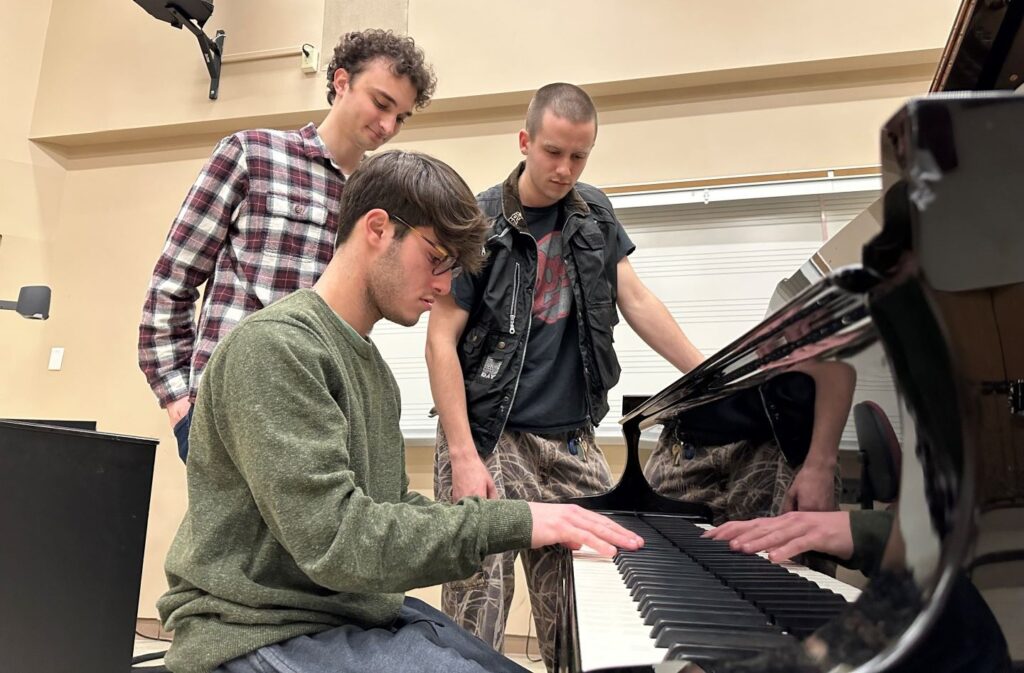
Daniel Ruggiero ’25, Owen York ’26, and Conrad Tilroe Jr. ’25 prepare for World Piano Day.
A civil engineering major with a minor in music, Ruggiero declares that music is more closely related to life than people realize.
Performing Debussy’s “La cathédrale engloutie (The Sunken Cathedral),” he is discovering its chemical qualities—water, tides, waves—as he prepares for the larger discussion about chemistry and music.
“Chemistry is everywhere. Music is everywhere,” Ruggiero says. “My job is to bring out the chemistry aspect of it, like how molecules interact with each other, how light reflects on water, and draw out the color and textures.”
Music has supported his engineering studies because it helps him see the world more clearly.
“I honestly think I’ve gotten better in my engineering studies by taking piano lessons,” he says. “Music gives me an ability to see and understand the world better, which is what engineering is all about. Music is a reflection of that.”
For Tilroe, a music major with a minor in history, World Piano Day offered a forum to present one of his first compositions, a multi-movement work, to be premiered by Roadfeldt.
“I actually came to this school with the intention of pursuing a physics and mathematics double major. But I sort of arrived mid-transition and recently discovered my passion for music and music making,” he says, noting that his composition reflects the theme of Lafayette’s World Piano Day program.
“Music, especially if it doesn’t have words, can do the same things as chemistry,” Tilroe adds. “In a similar way, chemistry, like most of the sciences, pursues different forms of abstraction to explain the phenomena that we see in the world. My piece is very emotional and draws on my personal life experience. I just found it an interesting process to draw on these personal things, my emotions, and then abstracting them into this form on paper and handing it off to a performer. It’s sort of similar to when people say that emotions are just chemical reactions that happen.”
“I think it’s a cool way to bring people together,” says York, a music major with an English minor. “Hopefully it brings attention to what we have here. I don’t see how anyone could not enjoy going to a concert in this beautiful space. To think that Wynton Marsalis was just here.”
He chose Lafayette because it places an emphasis on programs such as the one planned for March 28.
“The reason I think the music department is very interesting is because a vast majority of the people who are involved in ensembles and take private lessons here, they’re not music majors. A lot of them are engineering majors or involved in the sciences,” he says. “And so, I think it’s a chance for a lot of those people to have their worlds collide a little bit, and hopefully to bring in more people from other places on campus.”
